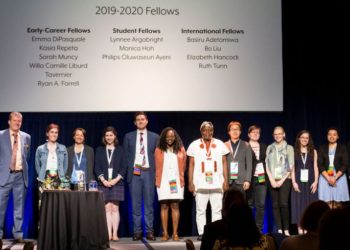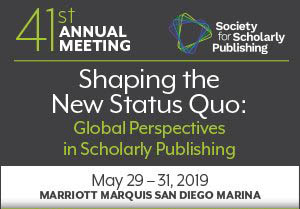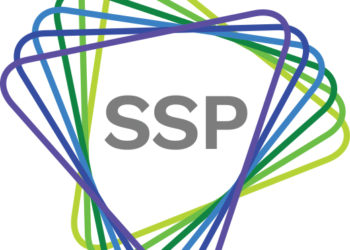Editor’s Note: Today’s post is by Christine Orr. Christine will be joining BioOne as the Director of Sales and Marketing in August 2019. Christine holds a master’s degree in library science and has held roles spanning business development, library relations, marketing communications, and consortia licensing.
I belong to a book club. Among its many virtues is that it not only gets me to an excellent dinner party once a month, but I read titles I’d never select on my own. OK, so I’m still not quite done with Donna Tartt’s The Goldfinch from 2014 but there you go. Sure, I could read only what I know I’ll enjoy, but this way I get to hear insightful commentary and varied perspectives from each clever bibliophile.
In the case of the 2019 Society for Scholarly Publishing (SSP) Annual Meeting, it would have been easy to plan only what we know works: panel discussions, keynotes, and the exhibit hall (oh, and cocktails to facilitate networking, kind of like book club). But early in the process, the idea for a new program track emerged around the concept of experimentation and non-traditional formats. Why? To support the interaction of diverse voices, to provide a space to be brave, and frankly to see what might happen.

The Unsession: What was it & what happened?
One of the non-traditional formats that we tried was an Unsession. Some folks on the planning committee had attended “Unconferences” where only a loose structure was in place: a broad topic and a place to meet. Basically, get a bunch of professionals together and see what perspectives, solutions, and inspirations emerge. Could we translate this for SSP and provide a worthwhile addition to the program?
SSP attendees were invited to “BYOT — Bring Your Own Topic” to the Unsession, and we primed the pump with plenty of announcements via social media. Once in San Diego, we also encouraged participation via posters in the registration area, garnering some additional suggestions.
In the end, we had ten eager attendees who could not be categorized: early-career and seasoned veterans, humanities and STM specialists, publishers and vendors, male and female, those who came with topics in hand and some who came to listen. As facilitators, we limited our participation so attendees could take the discussion in a direction that was valuable to them. This is what people talked about:
What About the Humanities & Plan S?: The SSP program had several sessions on Plan S, including one concurrent with the Unsession, yet people still wanted to talk about it in this less formal setting. Clearly the humanities are not as impacted by funder requirements for open access, however they may still experience fallout from broadly adopted policies. According to the attendee who raised this topic, the grant award statistics in humanities vs STEM reflect the same disproportionate attention to STEM at SSP (as evidenced by the large number of Plan S sessions).
At an industry event inviting diversity and new voices, her conclusion was that there should be more opportunity to give voice to scholarly communication issues in the humanities, especially regarding the impact of ill-fitting policies. Someone made the observation that all too often conference panels have a single humanities speaker on an otherwise STEM-oriented panel. While some representation is better than none, that imbalance can be seen as tokenism.
Next, the group moved on to something that hadn’t been suggested in advance and wasn’t on the conference program: Issues surrounding conflict of interest (COI). The group agreed that reputations of researchers, publishers, institutions, and even countries were at stake, and the group’s concerns coalesced around two broad areas:
- Workflow issues: A medical publisher says her days are filling up as she looks across peer review and editorial systems to identify possible conflicts of interest. As our systems must accommodate rapid growth, this personal (manual) approach isn’t scalable. How can we codify disclosure and assert trust, and still provide rapid, frictionless processes desired by researchers? Can technology help us identify the person is who they say they are, and truly has the credentials they claim? Where does the responsibility for checking COI appropriately lie?
- Global differences in the conduct of research: In many countries, graduate students are required to take courses on the ethics of research, but this can vary, and may not be sustained over the course of a researcher’s career. How can we share the responsibility for ethical research across the community? Is there a role for ISMTE, CSE, or other professional and accrediting bodies to work together to define standards, or at least what must be universally reported?
What we Learned
Perhaps more important than the topics we discussed, we learned a lot about how people exchange ideas at conferences. The small group discussion facilitated a different style of communication and learning: the table talk was lively, and most attendees had something to contribute on both subjects. Despite no one really knowing what to expect from the Unsession, there seemed to be no real barriers to participation.
There was a real upside to having an alternative format for discussing hot topics (we’re looking at you, Plan S). In fact, most proposed topics were also included on the main SSP program. The secondary benefit was to provide a venue for underrepresented – yet clearly relevant — ideas.
If you’ve ever taken the DiSC personality assessment, the following might be familiar: the “C” or Conscientious type often fears being wrong, and the “I” or Influencer prefers collaboration and group activities. Should you lean towards the “Introversion” side according to Meyers-Briggs, you may be less comfortable being the center of attention in a large setting. I’m not always a fan of these “put people in one of 4 buckets” schemas, but they are a helpful reminder that not everyone synthesizes information the same way, or flourishes in the same scenarios.
It’s easy to see how speaking on a panel or posing a question in front of hundreds of industry peers would be particularly unappealing and possibly intimidating for many people. Last year Betsy Donohue wrote about “Finding Your Voice” which offers an interesting perspective on facing those fears. If we limit the formats for participation, aren’t we by extension limiting the variety of ideas and insights that can be exchanged? Further, if we create a variety of avenues through which our colleagues can contribute, then more of us feel deeply engaged in the community – which is to our collective benefit.
We found that the leader-free roundtable discussion accomplished the following:
- Supported a collaborative learning style
- Leveled the playing field – everyone was an expert AND a student
- Provided a more welcoming, intimate space to participate
- Opened up new perspectives on a seemingly well-covered topic
“The Unsession was a great way to be inclusive of different modes of learning, engaging, and exchanging of ideas. Not everyone is comfortable speaking up in front of a huge crowd; as an early career attendee, I know I struggle with it! The Unsession helped me feel more comfortable to ask questions, and express my thoughts and concerns.”
– Unsession attendee Alexa Colella, University of Illinois Press
Call to Action: What Kind of Programming Can Encourage Broader Participation?
One of these days I’ll actually finish The Goldfinch, but while that’s on the back burner, let’s think about how we can provide the benefits of the Unsession to a broader segment of SSP attendees. After all, the mission of SSP is to ”advance scholarly publishing and communication, and the professional development of its members, through education, collaboration, and networking.” If varying our program formats invites broader participation and collaboration, then we should continue the experiment in 2020. And doesn’t research tell us there is value in reproducing experiments? Here are a few suggestions from our team of moderators:
- Encouraging (or even positively weighting) program submissions from those who have not previously spoken at SSP, such as early-career professionals or those with experience outside the field. Hearing from established experts is a valuable part of the SSP experience, but truly new voices and perspectives could result in the cross-pollination of ideas that will be so valuable to scholarly communications going forward.
- Varied program formats that encourage participation, such as an “inspiration/conversation” where speakers warm up the room with brief talks, then participants discuss or workshop in smaller groups.
- Introducing the UnRoundtable: Within another roundtable-style session, reserve one “wildcard” table for a topic not on the program.
- Poster sessions: Presentation of an initiative and outcomes that worked (or didn’t). This might favor attendees who prefer a reading/writing learning style, and those who engage best one-one-one.
We’d love to hear your voice, so won’t you BYO-Idea in the comments below? The Unsession was only one of several non-traditional sessions at SSP 2019. If you attended or moderated another experimental session, what did you find valuable or worth repeating?
Now off to read The Library Book by Susan Orlean….
Many thanks to my Unsession co-organizers Anne Stone, Jackie Perry, and Phill Jones for their contributions to this article, and for the energy they brought to the Unsession experiment.
Discussion
8 Thoughts on "Guest Post: Pull up a Chair: SSP’s Unsession Empowers New Voices"
So I’ll say upront my comment isn’t necessrily about the substance of the article but about the image used to accompany the article, is it a stock image and why was it used?
A personal gripe of mine is the use of stock images to import ‘diversity’ (in the protected characteristic sense) into articles, presentations, bids, CSR reports. Especially where a commensurate level of diversity does not exist.
If that is an actual image from SSP 2019 then I will eat an entire portion of humble pie. But something tells me it isn’t.
Hi Nik,
That is indeed a stock image (what you get if you search for “roundtable discussion” on the stock photo service we use). We use stock images for the majority of our posts. I did not attend this particular session at SSP so cannot vouch for the composition of the participants, but perhaps an attendee can provide that information.
SSP has been a leader in raising awareness and working to improve the diversity, equity, and inclusion in our industry. The Scholarly Kitchen has, through the efforts of several of our Chefs and some superb guest posts, become a visible center for much of the discussion, which I think is a valuable thing.
In those discussions with advocates and experts, one piece of advice we received at the blog was that it would be useful to present imagery that included a diverse range of people when we were trying to represent scholarly communications activities. This, we were told, was more welcoming to those who feel underrepresented, and a way to help normalize thinking that diversity was expected in our community.
You raise an interesting point though – does this create a false impression, covering up for a lack of diversity by faking it through stock photos? I don’t know if this outweighs the positives mentioned above, but am always open to hearing arguments for ways we can better serve and represent our community, so please do let us know any further thoughts (and anyone else interested is welcome to join the conversation).
Kudos to the Unsession-ers willing to work outside the boxes. The concept of learning from what doesn’t work catches my imagination. That road is littered with lessons.
Thanks, Susi. There were definitely take-aways from this Unsession which will get filtered & refined for 2020. I’d be curious to hear what bubbled up from the other non-traditional sessions, as well.
“Someone made the observation that all too often conference panels have a single humanities speaker on an otherwise STEM-oriented panel. While some representation is better than none, that imbalance can be seen as tokenism.” – I really think this characterising the under-representation of the humanities as a “tokenism” might be misappropriating the struggle of people (especially from those protected characteristics) that suffer from tokenism. I think stretching the term to fit the representation of disciplines is mildly insulting in the struggle for better diversity and inclusion. Coupled with the stock photo…
Does SSP have a breakdown of members and meeting attendees among disciplines? I support having speakers from a variety of subject areas and programming that meets many needs, but I have rarely met someone at the annual meeting who does not work in STEM publishing. It may be that there is low attendance from those working in the humanities because they do not see relevant sessions on the program, but it is difficult to generate programming for people who do not attend and may not be involved on the program committee. I don’t remember anyone from the humanities participating in the education committee during the years that I was a member.
Hi Rich,
Thanks for your comment. I too wonder if we have a “chicken-egg” or self-perpetuating situation: with few humanities-focused sessions, will the folks in these disciplines find less value in the conference overall, limiting their attendance – and thereby participation? I can’t speak to whether SSP maintains stats on attendance by discipline, but a quick scan of the attendee list seems to validate your impression. Having also spent most of my career in STEM, I’ve always “found my people” at SSP.
Hearing from a broader range of our humanities/social science colleagues – both at the conference and represented on committees – would surely benefit us as a community. Are there any humanities publishers who’d care to add more in the comments here?
Best,
Christine
I think that it might be both – SSP is perceived as a STEM publishing meeting, so humanities publishers don’t attend, but I also think that many publishers in the humanities don’t have nearly the funding that publishers in STEM fields do. With the exception of commercial publishers that publish in both, a large of HSS publishing is done by University Presses, who have their own professional organization.
I, however, have found tremendous value in attending SSP, as a publishing professional in HSS. Seeing what is being discussed at the highest levels has allowed me to articulate some of my ideas much more clearly than I would have been able to without attending. I think it makes sense to be more welcoming of HSS publishing, not only to better represent all scholarly publishing, but to help HSS publishers also see the value, and thus have access to cutting edge and high level discussions about the industry. It better serves everyone when everyone is included.
Also, as a note, I am serving on the education committee this year 😉



